The Entrepreneurial Nurse: Unusual Side Hustles and Career Transitions
Many nurses have answered the call to entrepreneurship, starting successful part-time endeavors or profitable full-time enterprises. The nurses profiled here started interesting businesses that are unusual, creative, or outright quirky.
Learn from these nurses as they describe their start-up experiences, and from some business development experts who advise nurses. They will likely spark ideas for your own entrepreneurial adventure.
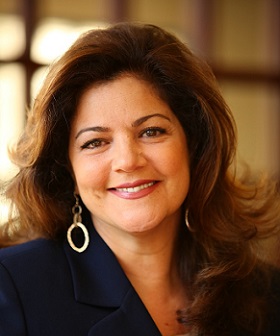
Michelle Podlesni, RN
President of the National Nurses in Business Association (NNBA)
What do you advise nurses who want to start a business?
I always ask them: What makes you happy? What makes your heart sing? Nurses are creative, and there are always ways to express more of who they are. You can design a workstyle around your lifestyle. We’re more than one thing—we may be moms, sisters, executives, fundraisers. Don’t limit yourself, and your potential. There’s no secret to business—it’s simple but, it’s not easy.
To make anything a business you need to make sure you have three things: Somebody who wants, needs, and desires it—and who is willing to pay for it. You have to be able to produce your widget, content, or product. You also have to administer money effectively and profitably. I always advise nurses to identify the fastest path to cash. Bigger than your money investment, even, is your time commitment.
If a nurse doesn’t have a strong interest or passion, then what?
Some nurses don’t want to do their own thing, they want a business in a box. Franchises are well-suited to nurses. And there are all kinds of opportunities out there. I do have one big caveat —always test your assumptions before investing. Nurses don’t do enough due diligence. Do proper investigation before putting money in anything, whether an MLM, franchise, or a website design service.
What does the NNBA offer someone new to that path?
About 50% of our members are nurses who are aspiring entrepreneurs. We have many resources and tools on our website and Facebook page. Nurses interested in more freedom, flexibility and financial rewards can also attend our Nurse Entrepreneurship & Career Alternatives Conference. It will be held September 27-29, 2019, in Las Vegas, Nevada.
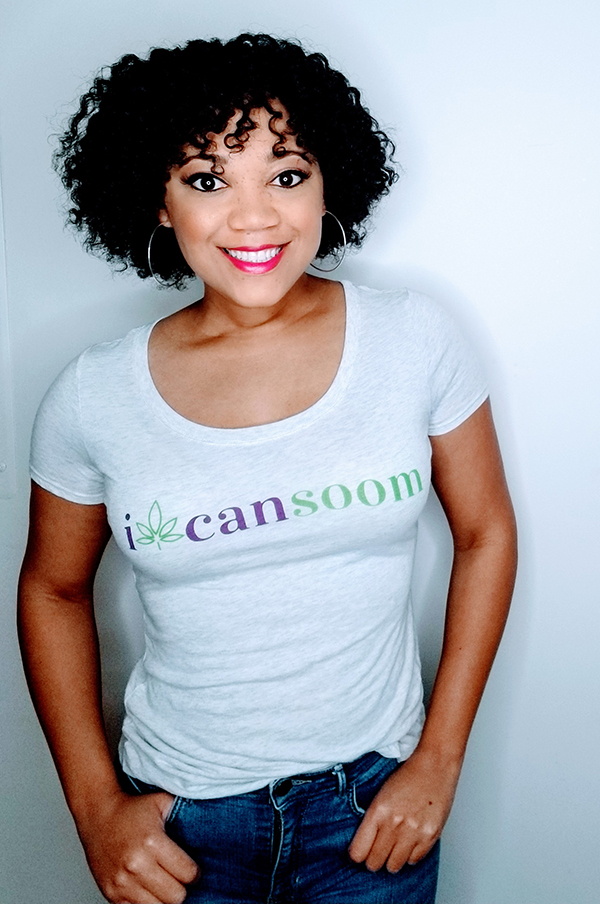
Lolita Korneagay, RN, BSN, MBA, LNC
Nurse Medical Cannabis Consultant and Founder of Cansoom
Tell us about your unusual new venture.
I started Cansoom in 2017, and my business is all about teaching people to use cannabis in a healthier way. There are two types of people that I teach: Regular people and medical professionals—that’s the train-the-trainer portion of my business.
Cannabis is important because there are 40 million people in the U.S. who use it. (It’s legal in over 30 states for medicinal use, and for recreational use in 10 or 11 states right now.) Year by year, the users are increasing, and medical professionals need to be prepared. But there are not a lot of opportunities for them to learn.
What was the genesis of your business?
It grew out of a personal need. I was diagnosed with a condition and was in a lot of pain. I had surgery, but the pain continued. I thought: If medical marijuana can help cancer patients, maybe it can help me. It took 22 months to come up with a treatment plan. There were no authoritative books, so I tested everything on myself. Then I put it in a handbook, and later I put together classes.
What’s your advice for a nurse who wants to become a medical cannabis consultant?
If you don’t have a passion for a certain business, you won’t be able to keep going. We need nurses to be patient advocates and to dispel myths. Within the African American community, for instance, marijuana has negatively affected it because people were imprisoned for just possession. But that’s not the case anymore.
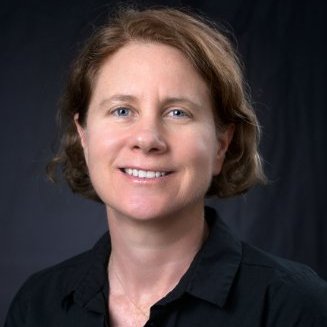
Gwen Jewell, RN, BSN, CWS
Founder of Jewell Nursing Solutions
How did you come up with the idea for your wound care pillows?
I worked on a med-surg unit and started asking: Isn’t there anything better for bed sores? Most professionals say to turn patients and reposition them every two hours. But there is so much more to it than that. It’s not easy. No wonder we get more and more pressure ulcers.
I know a nurse who has been a nurse for her whole life and she’s in her 80s. The whole time she never saw a pressure ulcer. At least 50% of what I see now as a wound care nurse is preventable. A nurse’s day is getting more and more crowded with technology. There is less time to do the simple, basic stuff like turning a patient.
My side hustle has been trying to figure out how to make a support cushion that honestly works, as comfortable as possible, without touching the bedsore.
How did you design and develop your invention?
I called up a foam manufacturer and they gave me chunks of foam. I bought a knife to cut the foam and sew the cover. I tested it on myself and others like my brother who is paralyzed from a spinal cord injury.
It’s hard to get this information to the people who need it. There’s a long learning curve. I finally bought Google ads and sell them, mostly to patients at home. I work on it whenever I can before going to work. (I work swing.) It’s become a passion to put it out in the world. I want to leave a legacy and make a real impact toward creating a world where pressure wounds are a thing of the past.
What’s your advice to nurses with a product idea?
Just do it! We have a whole industry around nursing innovation. Like the woman who developed the colostomy bag, way back near WWI time. She did it for her sister, a young woman with chronic Crohn’s who fell into a depression after surgery. She struggled for 10 years to get anyone to listen.
If you have a good idea, then lean into it. Don’t quit your day job. Test it out first. Fear is the biggest deterrent. We’re in a nursing shortage, so we are always needed and can always get work. So, don’t be afraid.
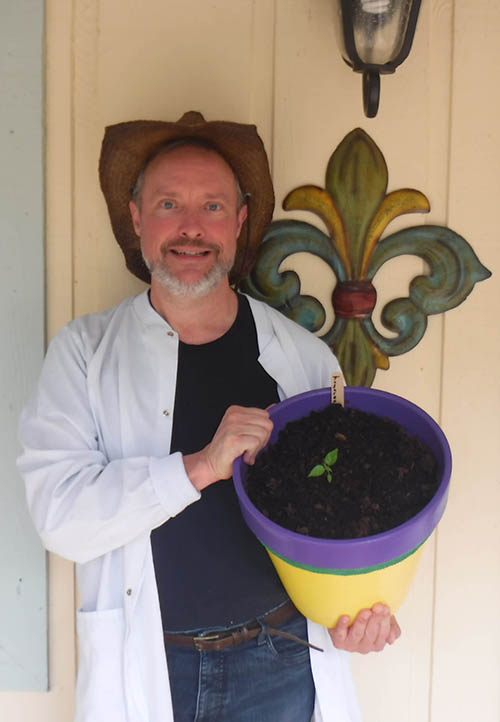
Clifton Joullian, RN, BSN
The Nurse Farmer
How did you come to start this venture?
In studying for my bachelor’s and gathering data, I found some research related to the health benefits of gardening. I was a backyard farmer, so I asked myself: What if I could teach people how to grow their own food organically and how that could help promote health? I had a conversation with Michelle [Podlesni] at the NNBA and she told me it was a great concept, to go to Facebook, create a page, and see where it goes.
How do you fit it in with your nursing job and family life?
My husband and I both grew up in Mobile, Alabama—when I took a job as a travel nurse, we went to Vallejo where we had a large—by California standards—farm and grew citrus, vegetables, and kept hens. That’s where our two sons were raised. We adopted them when they were 4 and 6—and they’re now 18 and 20. For them, gardening was more of a chore. But children will eat more fruits and vegetables if they raise them and those habits go with them into adulthood. It’s like a piece of art: if you raise it, you’re going to share it with others and eat it.
What’s next for you as The Nurse Farmer?
I’m not making money yet, but I plan to kick it up a notch. After both our sons graduated, we moved back to Alabama last year, onto a 10-acre farm. The climate is different, and I made some poor choices, but I’m getting back into Alabama mode. We’ve already got some vegetables; next is herbs and flowers to attract pollinators.
I’m working on a collaboration with The Nature Nurse, Susan Allison, that we hope to launch next year. I’m working with a new local farmers market doing free BP checks. I’m hoping to do cooking demonstrations, like showing people how to process tomatoes, turn them to Creole sauce, but without the salt.
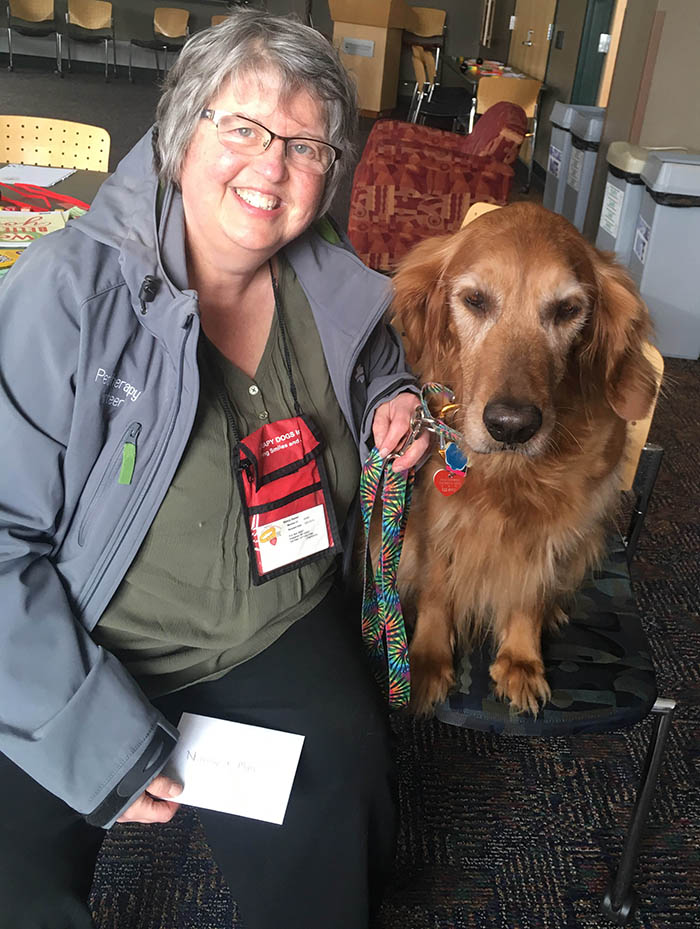
Nancy Joyner, RN, MS, APRN-CNS, ACHPN
Owner of Mya & Me therapy dog team and author of Through Mya’s Eyes
How did you start your entrepreneurial journey?
I’ve worked for 40 years as a nurse—I tell people I’m seasoned, not old! I also work as a nurse mentor for a group of diverse nurses. I’ve done everything in nursing—from NICU to hospice—but my specialty is palliative care. When I incorporated Mya as a therapy dog in my practice, she brought so much comfort and joy. I’m retirement age and was having physical and other medical issues so I wanted to try something less demanding.
What was helpful to you in launching your book?
I found the [NNBA] and started a five-year plan there. A booklet was the easiest thing to publish, so I wrote What If the Doctor Asks Me About CPR? My second book was a “real book,” Through Mya’s Eyes, which is told from her point of view. The unique thing about my book is that includes color artwork, drawings, and paintings from students ages 14 to 18. The book is for a younger, family-oriented audience.
You have a multidimensional enterprise—what else do you do?
I own Njoy Publishing, Nancy Joyner Consulting [palliative care consulting service], and a pet sitting business, too. Mya, my therapy dog, is part of my practice. A therapy dog has to go through a lot of training so she can go to the scene of an accident or she can be around during an assisted activity. A therapy dog has to be invited, and there can only be one dog at a time. Mya is a favorite with patients with dementia: They can be mute, and then all of a sudden, with her, they will talk.
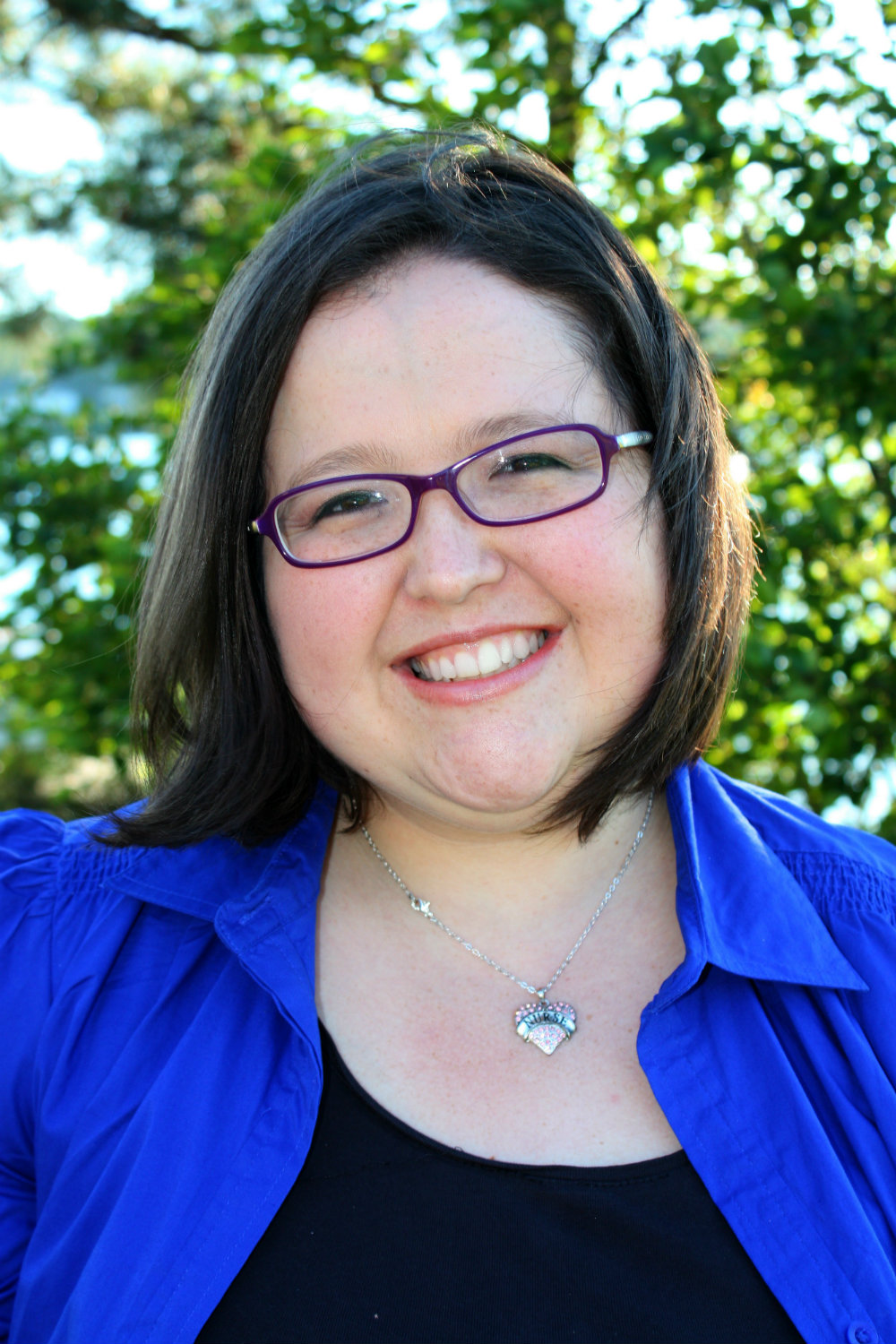
Brittney Wilson, BSN, RN
The Nerdy Nurse and Cofounder of The Health Media Academy
What’s the best way for a nurse to explore entrepreneurship?
I always recommend nurses start a business as a side hustle, because it’s too stressful otherwise. If you start off full-time, it’s too hard, especially if you’re the primary breadwinner, which many nurses are. Figure out something you can do part-time on the side and do that. As a nurse, you can work three days a week on the floor and one on your business, and the rest can be for your family. You have to make time for your family—if not, your family will resent it and you really need their support to succeed.
How do you get so much done, with a corporate job, a blog, and now the Academy?
You have to be focused. A lot of people aren’t strategic; they fly by the seat of their pants. That little bit of time that you’ve devoted to your business, you have to be 100% focused to write that blog post. Ask: Is it a task that will produce revenue? However, sometimes a business just finds you. I didn’t start blogging with the intent to produce revenue. I started my blog because it was fun, it was my hobby, like other people crochet. At first, my blog didn’t make money. If it’s not fun, you might as well work more hours at your job.
With so many business options, how does a nurse decide what to pursue?
Don’t begin with deciding if you’ll be selling essential oils or CBD oils. I started my business by focusing on making connections. It’s better to build a personal brand first and cast a net that’s a little wider before niching down. Focus on general wellness, healthy eating, and healthy living; get known for that, then after you’re trusted, later you can sell oils. Build your brand first and your revenue later. Know that it’s a long game, and you may not earn income for six to nine months. It’s been said that “there are riches in niches,” but you don’t want to start out so hyper- focused that you have no ability to pivot if you see a business model isn’t right for you.
What part of the entrepreneurial journey is hardest for nurses?
Nurses are used to hard work, but business is marketing and sales and they’re not comfortable with that. But think about it: everything you do in nursing is a sales pitch—time to ambulate after surgery—that’s a sales pitch. Nurses are masters of persuasion and educating patients on the benefits of completing a task. They just don’t realize that’s what sales is and that they already know how to make a sales pitch; they just call it education.
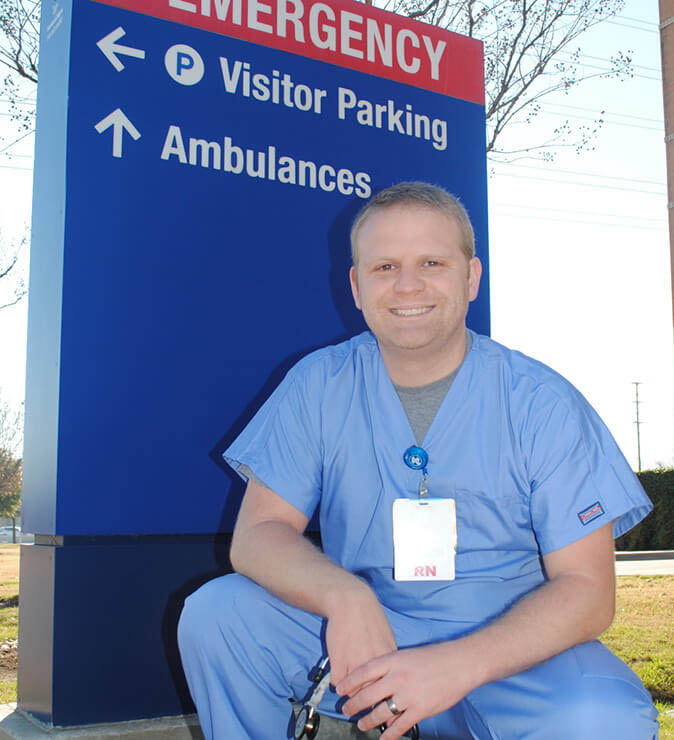
Jon Haws, RN, BSN
Founder and CEO of NRSNG
Do you find that any particular skillset or mindset is crucial for entrepreneurs?
One of my favorite quotes is “you are only as successful as the level of problem you are able to solve.” I have no idea who said that, but it has had a profound impact on growing NRSNG. To me, it means you have to be able to take on greater and greater challenges as you grow your business. So, to answer the question, I believe that one of the most important skills a business owner can possess would be the ability to manage chaos and roll with the problems and punches. Just like in nursing, there are 1,000,000 things you can focus on, but only a few matter. Being able to identify those few problems that matter and solve them will help you and your business grow.
What tips do you have for nurses employed full-time who want to make a total transition?
Patience. Many people think they have to “win” today. This mindset will lead them into doing things that simply make money versus doing things that benefit their customers. It’s all about building something that brings real value to the world . . . not about just quitting your job. I think when the customer really becomes your focus versus just trying to make enough to quit a job, this will reflect in your business. Customers will notice that you really do care and you are fighting to solve their problem.
Any other advice for our minority nurse readers about entrepreneurial life?
At NRSNG our mission is to end the nursing shortage. This is a global problem with a huge scale. We respect the enormity of what we are trying to do and that drives our decisions. If we had small goals, we would make small decisions. Instead, we adopt a world-changing goal and make all of our decisions from that vantage point.
There really isn’t anything “easy” about the entrepreneur life, but it truly is the most fulfilling journey in the world. Watching users find success with your product, watching employees buy into the mission, watching your kids find love for the company. It’s incredible. Find a big mission and chase it like hell!
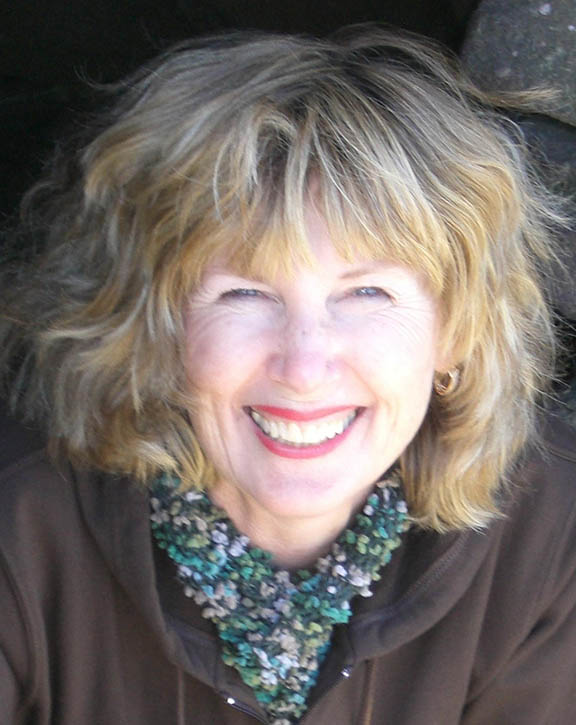
Donna Maheady, EdD, ARNP
Founder and President of Exceptional Nurse
How did you come to start Exceptional Nurse?
Lauren, my daughter, was born in 1986 and later diagnosed with autism, OCD, epilepsy, and a host of other autism-related challenges. I quickly became an advocate for her, and overtime expanded my advocacy efforts to include nurses and nursing students with disabilities.
Is it a business, or a nonprofit, or a passion project?
Exceptional Nurse is a nonprofit resource network for nurses and nursing students with disabilities. The nonprofit provides information, support, mentors, employment opportunities, social media, and related articles. It also awards scholarships to nursing students with disabilities.
What entrepreneurial lessons have you learned?
Do what you love! Being a risk taker is important along with being resilient… moving past setbacks and criticism. A strong work ethic is also important—being an entrepreneur isn’t a 9-5 job! It takes hard work and perseverance to succeed. Continue to learn new skills, network with others, and ask for help when needed. Give as much as you take. Surround yourself with positive, like-minded people. Manage money wisely.
What advice do you have for our readers?
To my fellow nurses and nursing educators, I would stress the importance of recognizing that disability is part of life…for everyone! Nurses with disabilities have knowledge, experience, and skills to share. They have walked the walk and gained insight into patient care. Their experiences inform and benefit their practice. Many have a passionate desire to care for others. Nurses with disabilities can be the best role models for patients.
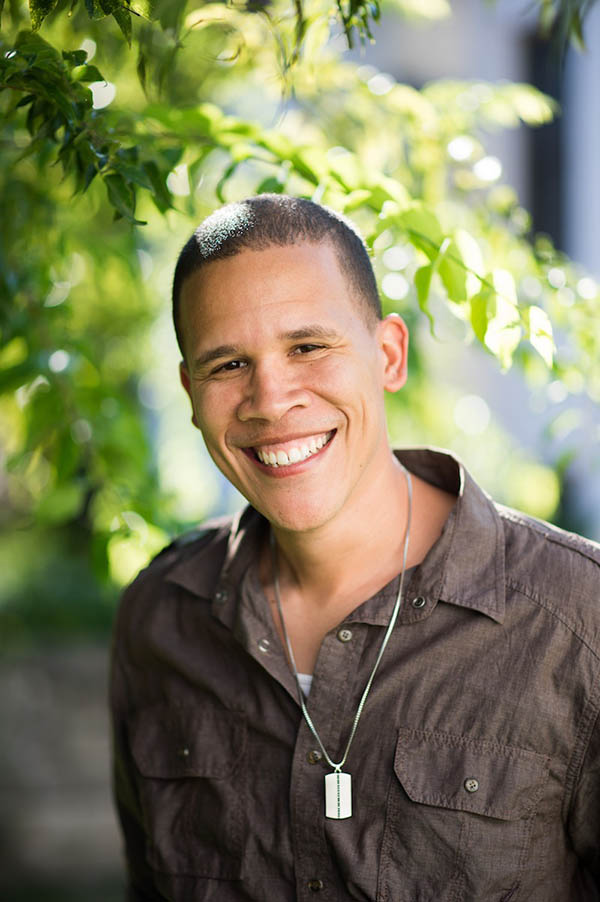
Paul Scrivens
Founder of Dare to Conquer
What productivity tips do you have for nurses who are employed full-time but want to launch a side hustle?
It’s tough. Mentally, the idea of making it all work is easy, but the execution is really hard. Usually it isn’t because of time. You can always make time. The biggest problem is willpower. At the end of the day, after working your tail off, you usually don’t [have] the willpower to get more things done.
The best thing you can do is come up with a long-term gameplan and lay out the tasks that you need to get done. Then break those tasks down as much as possible into smaller chunks. Now that you have these small chunks, take a look at your schedule.
For about a week, keep a journal with you at all times and every hour that you’re up, write down what you did for that hour. What you’ll usually notice is that the times you aren’t working or sleeping, there are lots of gaps where you’re not really doing anything.
Fill those gaps with bursts of effort where you get your tasks done. If you find that at the end of the day you mentally can’t do more things, then wake up earlier and get them done. Diet and exercise also go a long way.
- Resumes, LinkedIn, and HR Portal Profiles, Oh My! - May 22, 2020
- Weight Management for Nurses: The Why’s and How’s of Losing or Maintaining Weight - February 18, 2020
- Mindfulness and Wellness Programs for Patients - October 14, 2019
